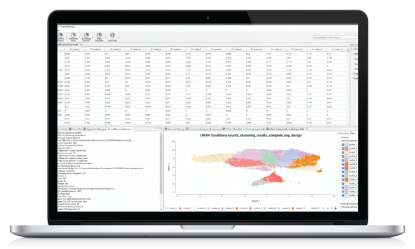BioBam Supported Project – with OmicsBox.
Researchers:
- Pr. Sami Aifa from the Laboratory of Molecular and Cellular Screening Processes (LPCMC) from the Centre of Biotechnology of Sfax, Tunisia
- Dr. Amor Mosbah from the Laboratory of Biotechnology and Valorization of Bio-Geo-Ressources (LBVBGR) from the Superior Institute of Biotechnology of Sidi Thabet, Tunisia
- Dr. Salma Abdeljalil and Pr. Ali Gargouri from the Laboratory of Molecular Biotechnology of Eucayotes (LBME) from the Centre of Biotechnology of Sfax, Tunisia
Project:
The purpose of our project is to identify potential ligands (peptides) and develop a novel diagnostic test to SARS-CoV using phage display technology. SARS-CoV (Covid-19) encodes four major structural proteins: spike (S), nucleocapsid (N), membrane (M) and small envelope (E) proteins.
Cell infection by SARS-CoV is initiated by the interaction of the surface S protein with human angiotensin-converting enzyme 2 (hACE2). The hACE2 protein was identified as the most important receptor for the SARS-CoV and its binding site on the S protein was localized between amino acids 318 and 510.
Phage library is a powerful molecular tool, allowing specific screening of optimal ligands of given targets based on an in vitro panning process. The phage display technology has been successfully applied for epitope selection, drug discovery and identification of Ligands. In a phage display peptide library, random peptides are expressed on the surface of a filamentous bacteriophage. The peptides will interact with the Spike protein blocking binding to hACE2. This phage display will concern all the identified variants of the Spike protein including the Tunisian one.
In this context, the use of OmicsBox will allow us to align many genomic sequences of SARS-CoV and precisely the Spike protein S derived from several countries impacted by Covid-19 and compare them to our local sequences for further research investigations. All those variants of protein S will be produced by heterologous expression and purified for phage display studies.
The Centre of Biotechnology of Sfax (CBS-Tunisia) offers a MiSeq plateform which performs genomic DNA sequencing and data analysis with base calling, alignment, variant calling, and reporting in a single run which allows is to locate consensus regions that are involved in the Spike/hACE2 binding process.
This project is now supported with free access to all OmicsBox resources, including all modules and unlimited cloud computation.

